The late 1980's Madchester phenomenon
Page 1 of 1
 The late 1980's Madchester phenomenon
The late 1980's Madchester phenomenon
How Madchester put the E into enterprise zone…
In the late 80s, acid house and ecstasy put Manchester at the heart of the pop universe and helped in the rebirth of a great city
Miranda Sawyer
guardian.co.uk, Saturday 21 April 2012 19.12 BST
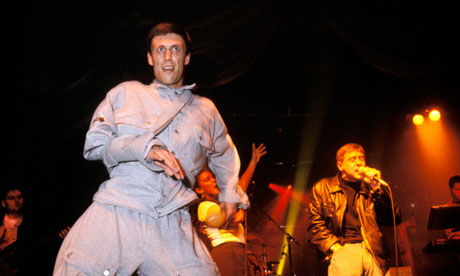
Bez, left, and Shaun Ryder of the Happy Mondays onstage. Photograph: Stuart Mostyn/Redferns
In 1988 I moved to London to work at Smash Hits magazine, and one of the first things I had to do was create a map of Manchester for the magazine's news pages. Dutifully, I put an X for where the Haçienda was, another for Dry Bar, also Eastern Bloc, the record shop co-owned by 808 State's Martin Price. Arrows pointing down towards Moss Side, for A Guy Called Gerald, up to Salford for the Happy Mondays… I even marked the Midland, in Didsbury, a pub where a hot and messy house night called MVITA (Manchester Vibes in the Area) took place in one pitch-black room, while the other featured fringed lampshades and elderly couples sipping light ale.
And as Smash Hits' resident Mancunian (though I'm actually from Cheshire), I was sent to interview the Stone Roses and Happy Mondays. Both bands were great to talk to: friendly, funny, cheeky, like most people in Manchester. People in London, though, seemed scared of the place, talked about it as though it was really rough, like an English New York ghetto. When I told them that they would love the Haçienda, that it was brilliant, a fantastic club with amazing music and enough space for anyone and everyone to express themselves, they looked at me as though I were mad.
Of course, no one in Manchester cared what London thought. They never have, really. And in the late 80s, when ecstasy and acid house combined to pull in a crowd that finally filled the Haçienda's vast warehouse space, got the place rocking so hard the sweat dripped off the underside of the balcony and made the walls wet and your head steam when you tipped out into the cool night air, Mancunians were having too much of a good time to notice that everyone else was staring.
Was that scene Madchester? Or was it the bands, the Roses, the Mondays and the rest, alternative rock bands with a loose groove, bass and drums melding in a funk that bridged the gap between white boy indie and the squelchy sounds of acid? What about other local artists, such as 808 State and A Guy Called Gerald, who actually made dance music, off-the-hook tracks such as "Cubik" and "Voodoo Ray" that drove the dancefloor crazy? Were they Madchester artists? Or just artists?
This summer sees the fully reformed Happy Mondays and the Stone Roses play again, the Roses gigs in particular threatening to give chunky men of a certain age a Proustian rush so strong you could mistake it for a heart murmur. This, despite the fact that both bands, even in their prime, were hit-and-miss live. Their inconsistency was part of their brilliance: you never knew quite what you'd get. Still, their albums, listened to in sober retrospect, are fantastic. The Roses' eponymous 1989 debut is especially amazing, almost perfect: combining groove and guitar, tune and attitude, west coast dreaminess with north-west wit. But the underestimated Happy Mondays, whose outlaw personalities and anecdotes were always given preference over their music, also made some revolutionary sounds, referencing the swaggering madness, the suck-it-and-see of Sly and the Family Stone.
It was a Mondays release, 1989's Madchester Rave On EP, that gave the scene a label, a hook for the world's media. As usual, Factory records' mouth-on-wheels Tony Wilson did his fantastic propaganda thing, going over to a US music conference to inform America that it was behind the times, that Manchester was where it was at, that it had swiped America's best music from right under its nose, sold it back to them and it hadn't even noticed. New York noticed Wilson, however, as well as Manchester's bustling band scene, and Time magazine gave Madchester a front cover.
But, as is often the way, once a scene has a label, it fundamentally changes. The label limits what's happening, deems some people in and some out, alerts the money-minded to the idea that there's cash to be made, tells the mainstream that something's happening that it should know about. And, just like that, the scene is invaded, changes, moves on, eventually dies.
And a scene as downright loopy as the Manchester acid house scene really defied a label. House music caused a sensation elsewhere in the country, of course, but in Manchester it had a focus. Down south, kids were forced to dance in fields; Manchester had a perfect, cool-as, ready-made venue in the Haçienda, owned by a band, New Order, who made one of the era's best albums, Technique.
It also had a music scene small and healthy enough to foster band ambition, disused industrial warehouse spaces for any after-hours raves (the clubs shut at 2am) and a generation of adventurous kids. Kids who'd travelled around Europe, following football teams, or just because; whose taste in music was already open enough to take in the 13th Floor Elevators; who had their own sense of style, with its own, very particular rules; who ran around setting up parties, labels, bands, merchandising as well as having a laugh. All that, plus natural PR machines such as Tony Wilson, Shaun Ryder and Ian Brown, whose every utterance had journalists cheering.
And journalists were interested, of course, because something was definitely happening. On Fridays and Saturdays, then Wednesdays, when Hot started, there were queues of kids in painters' jeans and sweatshirts, snaking round the corner from Whitworth Street back towards G-Mex, waiting to be let into the biggest, maddest youth club in the world. Just a few years before, in the mid-to-late 80s, the Haçienda was a different place, so cold you could never take your coat off, so empty you had the whole dancefloor to yourself. It staged gigs by Felt, local fashion shows hosted by Frank Sidebottom. Though we didn't know it then, the club was waiting, biding its time until the right youth revolution, the right sounds could fill it. Acid house was that music; Madchester was the scene.
'It was just a load of mad people, heads, faces, in the corner under the balcony. We didn't really talk, we just didn't stop dancing all night. The music was amazing."
I'm talking to actress Jo Hartley of This Is England (and, soon, Ill Manors, Plan B's new film) fame. She was 17 in 1989 and says that going to the Haçienda genuinely changed her life. "I'd been to nightclubs before, like Scandals, but you had to put on posh clothes and loads of hair lacquer, get yourself up like Anita Dobson, just to sit in a velvet booth and listen to Kylie Minogue."
Hartley, from Chadderton, near Oldham, was taken to the Haçienda by her then boyfriend, and she couldn't believe what it was like. Clothes were important, but in a different way ("I remember everyone wearing Levi's with the red stripe inside"), the music was like nothing she'd ever heard and the madness, the chaos, the bedlam on the dancefloor felt like freedom.
"You could really let go, you connected with a lot of people," she says. "It was a community that didn't exist in other clubs. You'd come out and you'd feel amazing. And there were a lot of talented people involved; they just didn't realise who they were at the time. Some of them are heroin addicts now, some of them are in prison, some are successful. But they were all cool. It changed my life, opened my head to people and possibilities."
Gary Aspden, now a successful brand consultant working with labels such as Adidas and JD Sports, also credits the Haçienda with changing the way he was headed. Originally from Blackburn, he and some friends hosted parties there on a Saturday night after the Haçienda shut. "Parties for the people by the people," he says now. They started small and got bigger, ended up in warehouses, but they were never about profit.
He remembers that with one of the first, there was money left over from the door. "So we sent a cheque to pay for 20 kids from Blackamoor special school in Blackburn to get riding lessons. It was in response to criticism from the local newspaper about people profiteering from acid house parties," he says. "The headmaster of the school tore the cheque up and went in the local press saying, 'We don't want their money.' I guess it was predictable. But still disappointing."
That community attitude behind the Manchester acid house scene isn't often remembered. Instead, the cartoon strip goes something like this: a bunch of scallies dressed in their fat uncle's cast-offs took lots of drugs and danced themselves silly. Then gangsters moved in, Madchester became "Gunchester" and the "one love" vibe died. But, at least initially, there was more to the scene than that. As both Hartley and Aspden remember, it felt like a revolution, like the right people were winning, that everyone was taking their nights out – and so their lives – into their own hands. Both know several people who were into fighting at football who just gave it up; Aspden thinks that the Tories took credit for stopping 1980s hooliganism when in fact it was ecstasy and acid house. "Madchester got them dancing," he says. "It might even have got some of them hugging, too. But we don't dwell on that."
Dave Haslam, Mancunian DJ and writer, sees the influence of Madchester in Manchester today. "Madchester was a chaotic, accidental, spontaneous burst of madness," he says. "An adventure, that's what I remember it as. No one controlled it, which meant that gangsters and corporate cowboys saw an opportunity. And once it was labelled, it kind of became about white boy indie bands, which made it more boring than it actually was. But you could say that the labelling had a value, in that it sent out a message that Manchester was being remade and that was a very important thing to say. Because in London, let alone New York and Paris, the view before then was that Manchester was post-industrial, everyone was unemployed, warehouses were lying empty, it was grim…"
The reputation that Madchester gave Manchester – that of a joyful, creative, sociable place of opportunity – has never left the city. Manchester is now all about going out. When I was young, footballers and their wannabeyourgirlfriends wouldn't dream of going into town: too scruffy and glum. Now, the city centre is packed at weekends, students move there because of the nightlife and just along from where the Haçienda used to be is a line of bars that, as Shaun Ryder once said to me, "have the look of the Haçienda but the attitude of Rotters".
The city has always boasted a forward-thinking, arts-oriented Labour council. That council, after the Haçienda had to be shut due to gangs muscling in and, especially, after an IRA bomb destroyed much of Manchester city centre in 1996, used the idea of Manchester as a social destination to reinvent the city. Now it has a world-beating arts festival, Manchester international festival, it has the BBC in Salford, it even managed to attract investment into Manchester City Football Club.
Perhaps it's stretching an argument to say that without Madchester, there would be no Balotelli. Still, the silly, moody, ridiculously talented Italian (loved to pieces by everyone who works at City) wouldn't fit in another British city. He'd be swallowed by London, squashed by everywhere else. In Manchester, they believe in craziness; they know that great things can come of it. Manchester's contemporary spirit and excitement emerged from many things. One of which was the gathering together, in the late 80s, of thousands of mad heads, in a parallel universe, a musical playground, a dream of Adidas-shod utopia.
In the late 80s, acid house and ecstasy put Manchester at the heart of the pop universe and helped in the rebirth of a great city
Miranda Sawyer
guardian.co.uk, Saturday 21 April 2012 19.12 BST

Bez, left, and Shaun Ryder of the Happy Mondays onstage. Photograph: Stuart Mostyn/Redferns
In 1988 I moved to London to work at Smash Hits magazine, and one of the first things I had to do was create a map of Manchester for the magazine's news pages. Dutifully, I put an X for where the Haçienda was, another for Dry Bar, also Eastern Bloc, the record shop co-owned by 808 State's Martin Price. Arrows pointing down towards Moss Side, for A Guy Called Gerald, up to Salford for the Happy Mondays… I even marked the Midland, in Didsbury, a pub where a hot and messy house night called MVITA (Manchester Vibes in the Area) took place in one pitch-black room, while the other featured fringed lampshades and elderly couples sipping light ale.
And as Smash Hits' resident Mancunian (though I'm actually from Cheshire), I was sent to interview the Stone Roses and Happy Mondays. Both bands were great to talk to: friendly, funny, cheeky, like most people in Manchester. People in London, though, seemed scared of the place, talked about it as though it was really rough, like an English New York ghetto. When I told them that they would love the Haçienda, that it was brilliant, a fantastic club with amazing music and enough space for anyone and everyone to express themselves, they looked at me as though I were mad.
Of course, no one in Manchester cared what London thought. They never have, really. And in the late 80s, when ecstasy and acid house combined to pull in a crowd that finally filled the Haçienda's vast warehouse space, got the place rocking so hard the sweat dripped off the underside of the balcony and made the walls wet and your head steam when you tipped out into the cool night air, Mancunians were having too much of a good time to notice that everyone else was staring.
Was that scene Madchester? Or was it the bands, the Roses, the Mondays and the rest, alternative rock bands with a loose groove, bass and drums melding in a funk that bridged the gap between white boy indie and the squelchy sounds of acid? What about other local artists, such as 808 State and A Guy Called Gerald, who actually made dance music, off-the-hook tracks such as "Cubik" and "Voodoo Ray" that drove the dancefloor crazy? Were they Madchester artists? Or just artists?
This summer sees the fully reformed Happy Mondays and the Stone Roses play again, the Roses gigs in particular threatening to give chunky men of a certain age a Proustian rush so strong you could mistake it for a heart murmur. This, despite the fact that both bands, even in their prime, were hit-and-miss live. Their inconsistency was part of their brilliance: you never knew quite what you'd get. Still, their albums, listened to in sober retrospect, are fantastic. The Roses' eponymous 1989 debut is especially amazing, almost perfect: combining groove and guitar, tune and attitude, west coast dreaminess with north-west wit. But the underestimated Happy Mondays, whose outlaw personalities and anecdotes were always given preference over their music, also made some revolutionary sounds, referencing the swaggering madness, the suck-it-and-see of Sly and the Family Stone.
It was a Mondays release, 1989's Madchester Rave On EP, that gave the scene a label, a hook for the world's media. As usual, Factory records' mouth-on-wheels Tony Wilson did his fantastic propaganda thing, going over to a US music conference to inform America that it was behind the times, that Manchester was where it was at, that it had swiped America's best music from right under its nose, sold it back to them and it hadn't even noticed. New York noticed Wilson, however, as well as Manchester's bustling band scene, and Time magazine gave Madchester a front cover.
But, as is often the way, once a scene has a label, it fundamentally changes. The label limits what's happening, deems some people in and some out, alerts the money-minded to the idea that there's cash to be made, tells the mainstream that something's happening that it should know about. And, just like that, the scene is invaded, changes, moves on, eventually dies.
And a scene as downright loopy as the Manchester acid house scene really defied a label. House music caused a sensation elsewhere in the country, of course, but in Manchester it had a focus. Down south, kids were forced to dance in fields; Manchester had a perfect, cool-as, ready-made venue in the Haçienda, owned by a band, New Order, who made one of the era's best albums, Technique.
It also had a music scene small and healthy enough to foster band ambition, disused industrial warehouse spaces for any after-hours raves (the clubs shut at 2am) and a generation of adventurous kids. Kids who'd travelled around Europe, following football teams, or just because; whose taste in music was already open enough to take in the 13th Floor Elevators; who had their own sense of style, with its own, very particular rules; who ran around setting up parties, labels, bands, merchandising as well as having a laugh. All that, plus natural PR machines such as Tony Wilson, Shaun Ryder and Ian Brown, whose every utterance had journalists cheering.
And journalists were interested, of course, because something was definitely happening. On Fridays and Saturdays, then Wednesdays, when Hot started, there were queues of kids in painters' jeans and sweatshirts, snaking round the corner from Whitworth Street back towards G-Mex, waiting to be let into the biggest, maddest youth club in the world. Just a few years before, in the mid-to-late 80s, the Haçienda was a different place, so cold you could never take your coat off, so empty you had the whole dancefloor to yourself. It staged gigs by Felt, local fashion shows hosted by Frank Sidebottom. Though we didn't know it then, the club was waiting, biding its time until the right youth revolution, the right sounds could fill it. Acid house was that music; Madchester was the scene.
'It was just a load of mad people, heads, faces, in the corner under the balcony. We didn't really talk, we just didn't stop dancing all night. The music was amazing."
I'm talking to actress Jo Hartley of This Is England (and, soon, Ill Manors, Plan B's new film) fame. She was 17 in 1989 and says that going to the Haçienda genuinely changed her life. "I'd been to nightclubs before, like Scandals, but you had to put on posh clothes and loads of hair lacquer, get yourself up like Anita Dobson, just to sit in a velvet booth and listen to Kylie Minogue."
Hartley, from Chadderton, near Oldham, was taken to the Haçienda by her then boyfriend, and she couldn't believe what it was like. Clothes were important, but in a different way ("I remember everyone wearing Levi's with the red stripe inside"), the music was like nothing she'd ever heard and the madness, the chaos, the bedlam on the dancefloor felt like freedom.
"You could really let go, you connected with a lot of people," she says. "It was a community that didn't exist in other clubs. You'd come out and you'd feel amazing. And there were a lot of talented people involved; they just didn't realise who they were at the time. Some of them are heroin addicts now, some of them are in prison, some are successful. But they were all cool. It changed my life, opened my head to people and possibilities."
Gary Aspden, now a successful brand consultant working with labels such as Adidas and JD Sports, also credits the Haçienda with changing the way he was headed. Originally from Blackburn, he and some friends hosted parties there on a Saturday night after the Haçienda shut. "Parties for the people by the people," he says now. They started small and got bigger, ended up in warehouses, but they were never about profit.
He remembers that with one of the first, there was money left over from the door. "So we sent a cheque to pay for 20 kids from Blackamoor special school in Blackburn to get riding lessons. It was in response to criticism from the local newspaper about people profiteering from acid house parties," he says. "The headmaster of the school tore the cheque up and went in the local press saying, 'We don't want their money.' I guess it was predictable. But still disappointing."
That community attitude behind the Manchester acid house scene isn't often remembered. Instead, the cartoon strip goes something like this: a bunch of scallies dressed in their fat uncle's cast-offs took lots of drugs and danced themselves silly. Then gangsters moved in, Madchester became "Gunchester" and the "one love" vibe died. But, at least initially, there was more to the scene than that. As both Hartley and Aspden remember, it felt like a revolution, like the right people were winning, that everyone was taking their nights out – and so their lives – into their own hands. Both know several people who were into fighting at football who just gave it up; Aspden thinks that the Tories took credit for stopping 1980s hooliganism when in fact it was ecstasy and acid house. "Madchester got them dancing," he says. "It might even have got some of them hugging, too. But we don't dwell on that."
Dave Haslam, Mancunian DJ and writer, sees the influence of Madchester in Manchester today. "Madchester was a chaotic, accidental, spontaneous burst of madness," he says. "An adventure, that's what I remember it as. No one controlled it, which meant that gangsters and corporate cowboys saw an opportunity. And once it was labelled, it kind of became about white boy indie bands, which made it more boring than it actually was. But you could say that the labelling had a value, in that it sent out a message that Manchester was being remade and that was a very important thing to say. Because in London, let alone New York and Paris, the view before then was that Manchester was post-industrial, everyone was unemployed, warehouses were lying empty, it was grim…"
The reputation that Madchester gave Manchester – that of a joyful, creative, sociable place of opportunity – has never left the city. Manchester is now all about going out. When I was young, footballers and their wannabeyourgirlfriends wouldn't dream of going into town: too scruffy and glum. Now, the city centre is packed at weekends, students move there because of the nightlife and just along from where the Haçienda used to be is a line of bars that, as Shaun Ryder once said to me, "have the look of the Haçienda but the attitude of Rotters".
The city has always boasted a forward-thinking, arts-oriented Labour council. That council, after the Haçienda had to be shut due to gangs muscling in and, especially, after an IRA bomb destroyed much of Manchester city centre in 1996, used the idea of Manchester as a social destination to reinvent the city. Now it has a world-beating arts festival, Manchester international festival, it has the BBC in Salford, it even managed to attract investment into Manchester City Football Club.
Perhaps it's stretching an argument to say that without Madchester, there would be no Balotelli. Still, the silly, moody, ridiculously talented Italian (loved to pieces by everyone who works at City) wouldn't fit in another British city. He'd be swallowed by London, squashed by everywhere else. In Manchester, they believe in craziness; they know that great things can come of it. Manchester's contemporary spirit and excitement emerged from many things. One of which was the gathering together, in the late 80s, of thousands of mad heads, in a parallel universe, a musical playground, a dream of Adidas-shod utopia.

eddie- The Gap Minder
- Posts : 7840
Join date : 2011-04-11
Age : 68
Location : Desert Island
 Re: The late 1980's Madchester phenomenon
Re: The late 1980's Madchester phenomenon
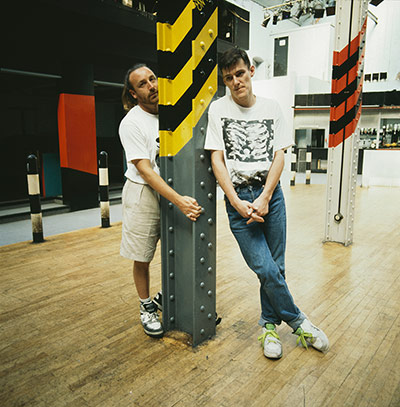
Peter Hook and Stephen Morris of New Order at the Hacienda club in Manchester, circa 1985Photograph: Kevin Cummins/Getty Images

eddie- The Gap Minder
- Posts : 7840
Join date : 2011-04-11
Age : 68
Location : Desert Island
 Re: The late 1980's Madchester phenomenon
Re: The late 1980's Madchester phenomenon
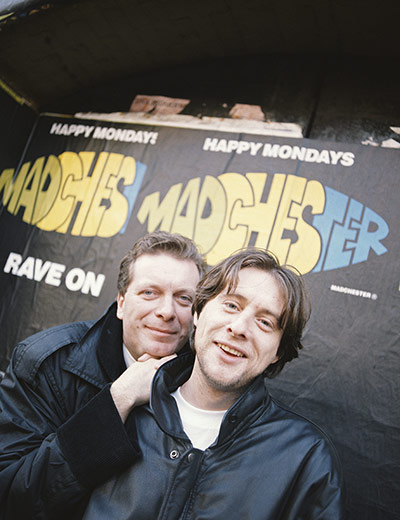
Factory Records boss and Hacienda founder Tony Wilson with Shaun Ryder of the Happy Mondays, circa 1989Photograph: Kevin Cummins/Getty Images

eddie- The Gap Minder
- Posts : 7840
Join date : 2011-04-11
Age : 68
Location : Desert Island
 Re: The late 1980's Madchester phenomenon
Re: The late 1980's Madchester phenomenon

Shaun Ryder performing with the Happy Mondays at the Hacienda, 10 May 1989Photograph: Kevin Cummins/Getty

eddie- The Gap Minder
- Posts : 7840
Join date : 2011-04-11
Age : 68
Location : Desert Island
 Re: The late 1980's Madchester phenomenon
Re: The late 1980's Madchester phenomenon
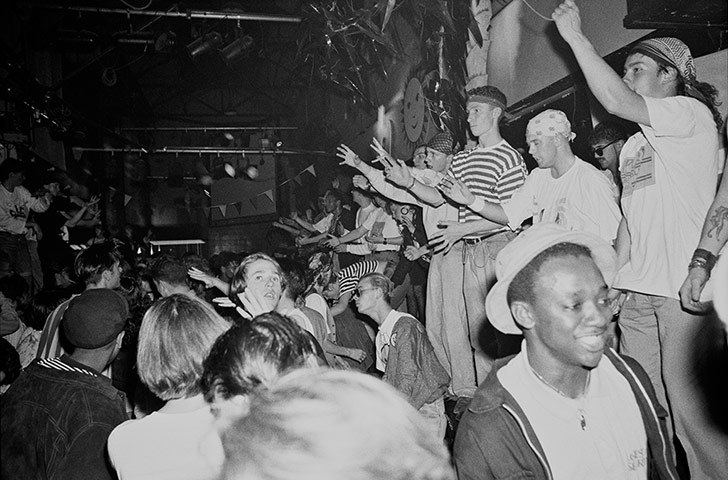
Clubbers at the HaciendaPhotograph: Kevin Cummins/Getty Images

eddie- The Gap Minder
- Posts : 7840
Join date : 2011-04-11
Age : 68
Location : Desert Island
 Re: The late 1980's Madchester phenomenon
Re: The late 1980's Madchester phenomenon
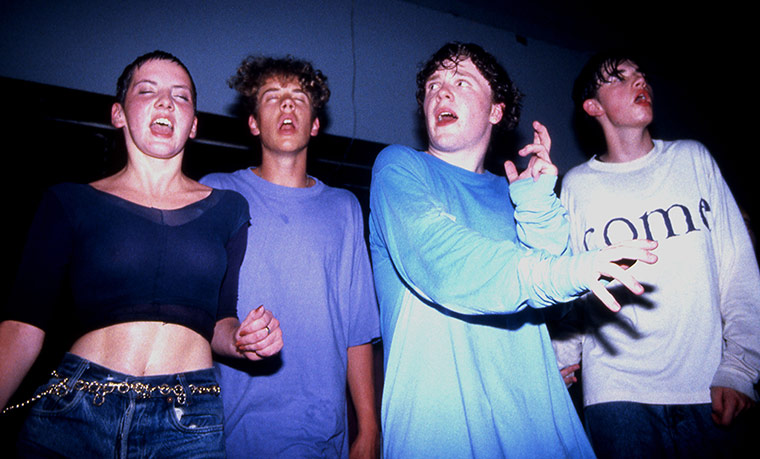
Clubbers on the main stage at the Hacienda in 1989 Photograph: Alamy

eddie- The Gap Minder
- Posts : 7840
Join date : 2011-04-11
Age : 68
Location : Desert Island
 Re: The late 1980's Madchester phenomenon
Re: The late 1980's Madchester phenomenon
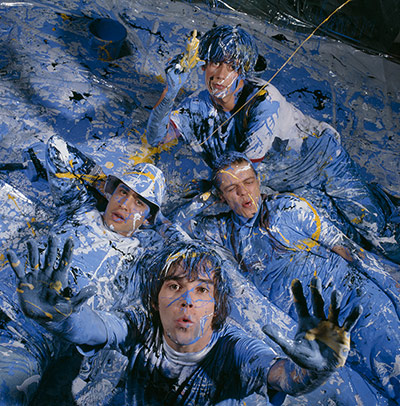
The Stone Roses photographed in Manchester for the cover of the NME in 1989Photograph: Kevin Cummins/Getty Images

eddie- The Gap Minder
- Posts : 7840
Join date : 2011-04-11
Age : 68
Location : Desert Island
 Re: The late 1980's Madchester phenomenon
Re: The late 1980's Madchester phenomenon
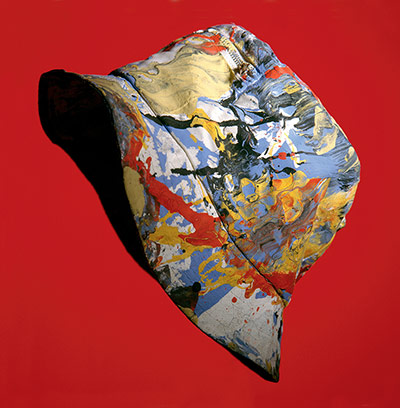
A paint-spattered bucket hat, as worn by drummer Reni of the Stone RosesPhotograph: Kevin Cummins/Getty Images

eddie- The Gap Minder
- Posts : 7840
Join date : 2011-04-11
Age : 68
Location : Desert Island
 Re: The late 1980's Madchester phenomenon
Re: The late 1980's Madchester phenomenon
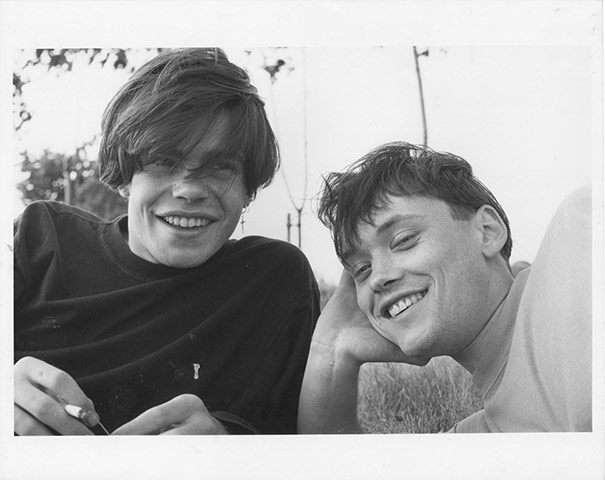
Tim Burgess of the Charlatans and Terry Christian, soon to be presenter of The Word, photographed in June 1990 by Matt Squire, brother of John Squire of the Stone RosesPhotograph: Matt Squire

eddie- The Gap Minder
- Posts : 7840
Join date : 2011-04-11
Age : 68
Location : Desert Island
 Re: The late 1980's Madchester phenomenon
Re: The late 1980's Madchester phenomenon
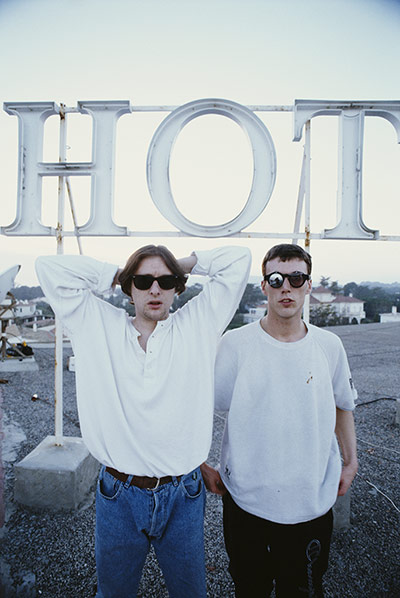 Shaun Ryder and Bez of the Happy Mondays on the roof of the Hotel Subur Maritim, Sitges, Spain, March 1990Photograph: Kevin Cummins/Getty Images
Shaun Ryder and Bez of the Happy Mondays on the roof of the Hotel Subur Maritim, Sitges, Spain, March 1990Photograph: Kevin Cummins/Getty Images
eddie- The Gap Minder
- Posts : 7840
Join date : 2011-04-11
Age : 68
Location : Desert Island
 Re: The late 1980's Madchester phenomenon
Re: The late 1980's Madchester phenomenon
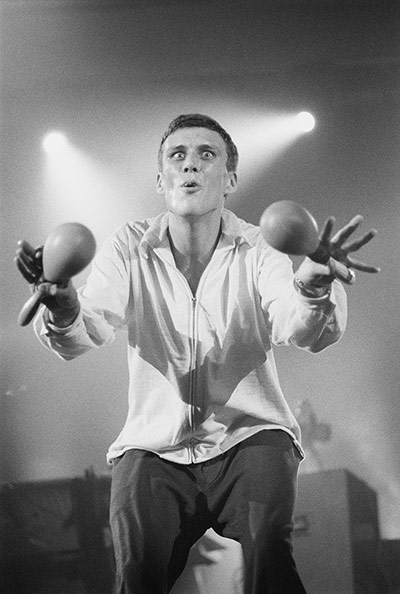
Bez performing with the Happy Mondays at Wembley Arena, 25 November 1990Photograph: Kevin Cummins/Getty Images

eddie- The Gap Minder
- Posts : 7840
Join date : 2011-04-11
Age : 68
Location : Desert Island
 Re: The late 1980's Madchester phenomenon
Re: The late 1980's Madchester phenomenon
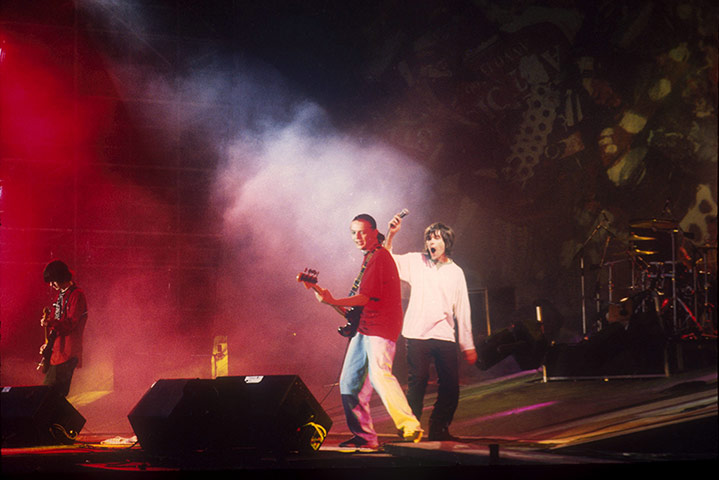
The Stone Roses play an outdoor concert for 27,000 people at Spike Island, in Widnes, Cheshire, on 27 May 1990Photograph: Andre Csillag/Rex Features

eddie- The Gap Minder
- Posts : 7840
Join date : 2011-04-11
Age : 68
Location : Desert Island
 Re: The late 1980's Madchester phenomenon
Re: The late 1980's Madchester phenomenon
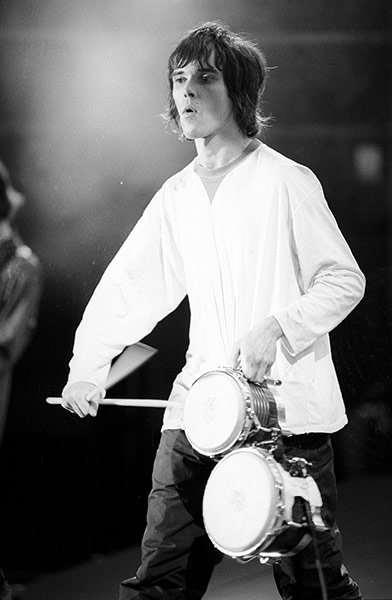
Ian Brown of the Stone Roses banging the drums at Spike IslandPhotograph: Kevin Cummins/Getty Images

eddie- The Gap Minder
- Posts : 7840
Join date : 2011-04-11
Age : 68
Location : Desert Island
 Re: The late 1980's Madchester phenomenon
Re: The late 1980's Madchester phenomenon
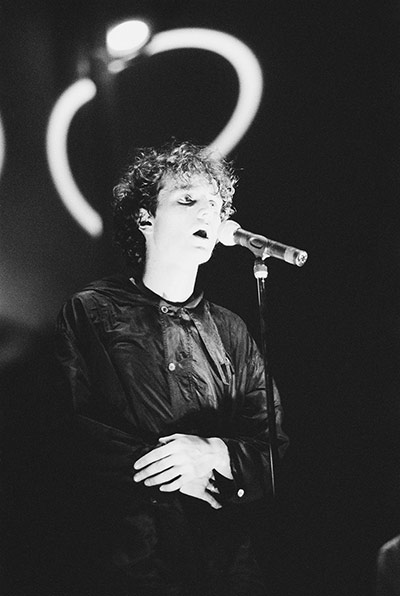
Tim Booth of James performing in Manchester, December 1990Photograph: Kevin Cummins/Getty Images

eddie- The Gap Minder
- Posts : 7840
Join date : 2011-04-11
Age : 68
Location : Desert Island
 Re: The late 1980's Madchester phenomenon
Re: The late 1980's Madchester phenomenon
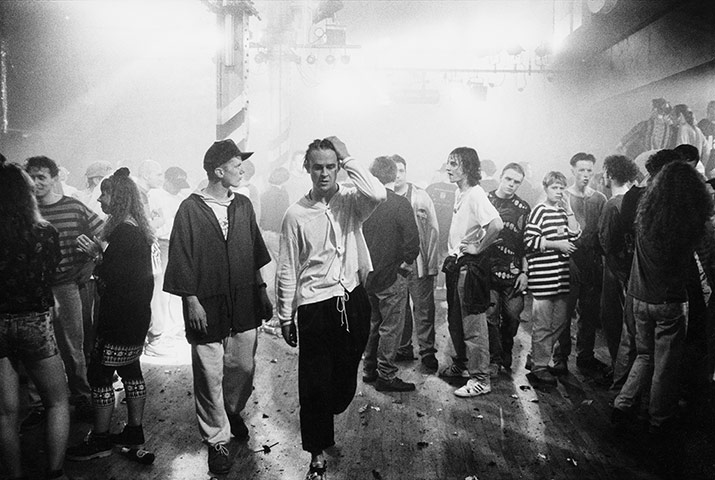
People leaving the dancefloor at the Hacienda on the night of the club's eighth birthday party, Manchester, 1990Photograph: Kevin Cummins/Getty Images

eddie- The Gap Minder
- Posts : 7840
Join date : 2011-04-11
Age : 68
Location : Desert Island
Page 1 of 1
Permissions in this forum:
You cannot reply to topics in this forum

